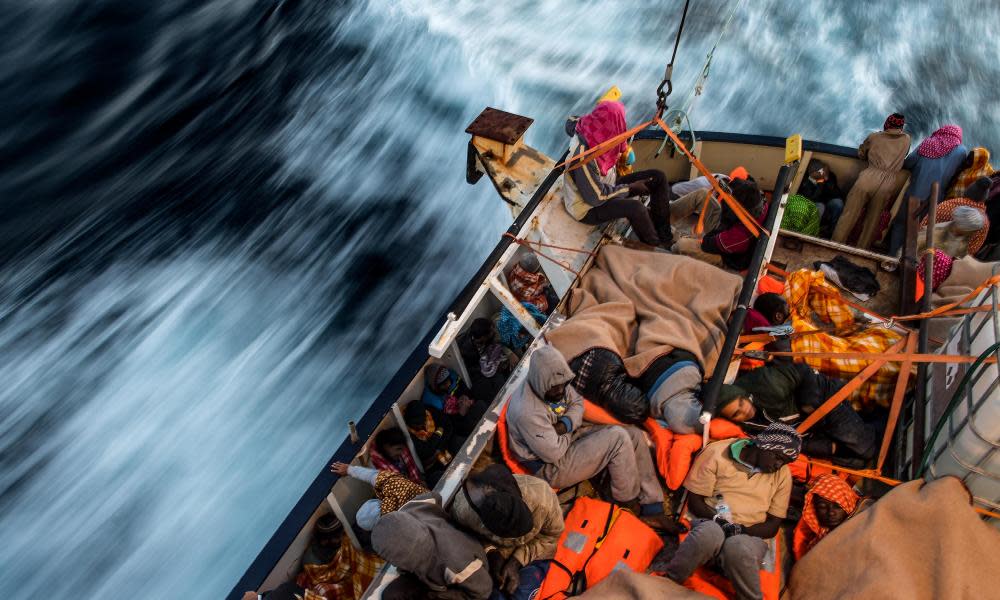Asylum seeker boat turnbacks illegal and don't deter people, report finds

Turning back asylum seeker boats is illegal under international law and does not deter people from seeking sanctuary by sea, a new policy brief from the University of New South Wales’s Kaldor Centre for International Refugee Law argues.
The Interdiction of Asylum Seekers at Sea: Law and (mal)practice in Europe and Australia, argues that neither Australia’s Operation Sovereign Borders, or the European Union’s operations Sophia and Triton, meet international legal obligations, or are viable long-term strategies.
“A detailed picture of noncompliance emerges,” report author Violeta Moreno-Lax writes.
“These deterrence operations do not accord with the UN convention on the law of the sea, the search and rescue convention, the safety of life at sea convention, the refugee convention, or the core international human rights treaties.
“The resulting EU and Australian policies neglect human rights and jeopardise the principle of non-refoulement, which prohibits states from sending people to any country where they face a risk of persecution, ill-treatment or other serious harm.”
Moreno-Lax, co-founder of the Centre for European and International Legal Affairs (CEILA) at Queen Mary University of London, argues that “deterrence policies do not really ‘save lives’”.
“They hamper desperate people fleeing war and persecution from finding safety. If the political will to save lives really existed, then governments in both hemispheres would replace the current securitised approach with a comprehensive, protection-centred vision.”
The issue of Australia’s boat turnbacks policy has been keenly contested in public debate.
The government has consistently maintained that boat turnbacks are an integral element of its deterrence policy suite, which includes mandatory detention offshore and a ban on resettlement in Australia for any boat arrivals.
The immigration minister, Peter Dutton, said last month that Operation Sovereign Borders “has brought maritime people smuggling to a standstill and saved countless lives”, intercepting and returning 30 boats carrying more than 765 asylum seekers.
“Yet despite our success we know the threat of people smuggling still remains.
“People smugglers have made numerous attempts to find a way through our defences, but on every occasion our border protection capabilities have succeeded in stopping them. Australia’s ability to detect, intercept and turn back people smuggling boats is now stronger than ever.”
The last asylum seekers to make Australian landfall by boat reached the Cocos Islands in May last year. They were deported within four days to Sri Lanka.
Writing for Guardian Australia, Father Frank Brennan, Tim Costello, Robert Manne and the former immigration department secretary John Menadue argued in February that “keeping boats stopped” must be accepted as a government mandate in order for Australia to be able to clear its offshore detention camps on Manus and Nauru.
“This crisis can be solved only by the advocates accepting political realities and the politicians agreeing to a bottom line of safety, transparency and legality in the securing of our borders.”
In response, a group of academics, including author of Across the Seas, Professor Klaus Neumann, have argued in the Monthly “the government’s turnback policy is internationally unlawful and that its continuation undermines the prospects of addressing the issue of forced displacement in our region”.
Guardian Australia has detailed the nature of Australia’s turnbacks regime, including asylum seekers being held at sea for more than a month, quartered in windowless lower decks holding 120 people, and the government building fishing vessels and lifeboats with which to forcibly return people.
It has also reported on the forced return of Vietnamese asylum seekers to Vietnam where they have been jailed and persecuted, despite written assurances from the government they would not be targeted.
Operations Triton and Sophia, in the Mediterranean, have been criticised over increasing rates of migrant drownings in the Mediterranean to the end of 2016 and an alleged failure to address the root causes of migrant boat journeys and the smuggling rings which facilitate them.
Director of the Kaldor Centre, Scientia Professor Jane McAdam, said the policy brief was a demonstration of why a legal approach to protection was needed to both save lives and allows refugees to find safety and security.
“Deterrence simply shifts the problem out of [our] sight; it doesn’t address the underlying protection needs.”
The Kaldor Centre brief argues Australia and Europe should conduct genuine “search and rescue missions” at sea, rather than interdiction operations, designed simply to intercept and turn around boats.
Countries should not automatically return asylum seekers to countries of origin, or transit countries such as Indonesia where, previously, significant numbers of Australian-bound asylum seeker have boarded boats.
Asylum claims should be assessed and processed on land, not at sea, the paper argues, and countries should create new “alternative pathways” to ensure safe and legal access to Europe and Australia, obviating the need for asylum seekers to rely on smuggling rings and reduce fatalities at sea.

 Yahoo News
Yahoo News 
